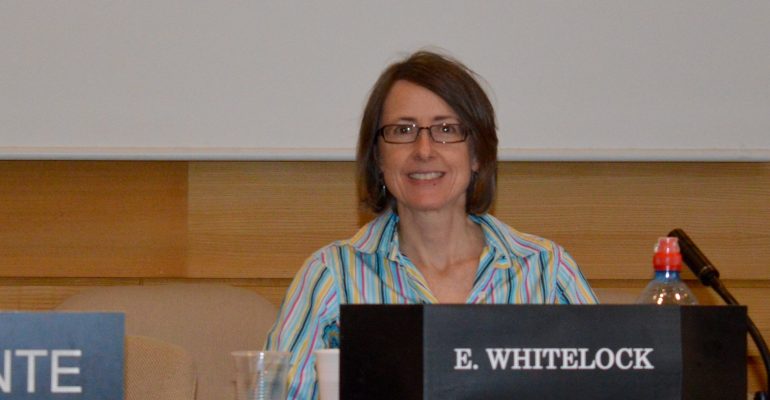Guest Blog by Emma Whitelock, CEO of Linking Education and Disability Scotland
“Thanks to a nomination from Soroptimist International, I had the enormous privilege of giving a presentation and being part of a panel session on the subject of, ‘Does e-learning address challenges of education systems worldwide?’ at the 2016 International UNESCO conference, ‘The challenge of the digital revolution for Non Government Organisations (NGOs)’.
One of UNESCO’s core functions is to serve as an international forum of ideas to guide the global debate on international education. Lifelong learning and improving literacy are at the heart of their Education strategy. Here are a few highlights and how good is the view from the canteen on the 7th floor of the UNESCO building!

President of NGO Liaison Committee, Martine Levy with Emma Whitelock (Leed Scotland) and SI UN Representative Marie-Christine Gries
By its flexible nature e-learning has the power to widen access to learning, but on the assumption that learners are confident and skilled in being able to participate online. It’s clear too many disabled people are excluded from such opportunities and are therefore being left behind.
Indrajit Bannerjee, Director of the Knowledge Societies Division, UNESCO Communication and Information Sector, stated that disabled people, 1 billion people, are the most marginalised community in the world in relation to accessing digital information online, “most are so excluded they don’t have access to education and employment”. He advocated for accessible technologies within ‘gadgets’ as one part of the solution.
Despite improved connectivity across Scotland many disabled people are not online or lack basic digital skills, experiencing barriers such as lack of access, support, motivation and low income. The Joseph Rowntree Foundation Annual Monitoring Poverty and Social Exclusion Report 2016 found that “half of people living in poverty are either themselves disabled or are living with a disabled person in their household”. Improved education can lead to economic empowerment as a route out of poverty.
I included a reference to the Carnegie Report, Digital Participation and Social Justice which talks about the digital revolution actually amplifying inequalities, ironically leaving behind the people who could stand to gain the most. Giacomo Mazzone, European Broadcasting Union spoke about the UK film, ‘I Daniel Blake’, to illustrate the negative impact of the digital divide.

SI UN Representatives Rina Dupriet and SI UN Representative Marie-Christine Gries
The Scottish Government recently launched ‘A Fairer Scotland for Disabled People’ the Delivery Plan to 2021 for the United Nations Convention on the Rights of Persons with Disabilities. In the spirit of this report, I stressed the practice of inclusion by default and involving disabled people in the design of services as the starting point. The #OneDigital project has created a Call to Action to Create a Digitally Confident Third Sector in Scotland with a mantra of explore, adapt, invest and collaborate. Asking people who use services is the starting point they advocate.
Many fears were expressed about the risks of being online and some called for NGOs to become data mediators in the same way that friends often become mediators of news shared through social networks such as Facebook. Giacomo Mazzone asked NGOs to empower local people to differentiate between credible & fake news online. I shared Scotland’s Cyber resilience Strategy and spoke about the multi-stakeholder Learning Network currently being set up to empower the public about internet safety and security.
Additionally, I talked about the ways in which Lead works with disabled people to co-design and deliver relevant informal, non formal and formal learning opportunities, on a one to one and small group basis with volunteer support and the loan of a device. We know this person centred approach, which builds on the person’s motivation to learn, builds confidence as well as practical skills and knowledge. Last year Lead supported 199 learners to use enabling technology, with impacts such as increased independence, connection with family, and a springboard to further learning, volunteering and work. The audience was very receptive and positive about our work.
Inclusive e-learning opportunities have the potential to address some of the challenges of education systems around the world because they can be flexible, low cost, can transcend geographical boundaries, inspire new ideas and connections and can lead to economic empowerment. Only if we do not leave anyone behind.
I want to thank Soroptomist International, particularly SI Director of Advocacy, Pat Black, for nominating Lead Scotland and the UNESCO Committee for saying yes, and for their financial support received in order to attend. I was on the only all female panel of the conference, which felt particularly important given the gender inequalities which were highlighted across the world. Thank you to all the learners who choose to learn with Lead and to the staff and volunteer team who passionately believe in equal access to learning”.

